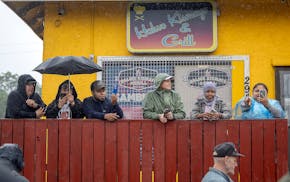SARTELL, MINN. – Marcie Knox thought she found her forever home when she moved into a mobile home park here in 2017. The 65-year-old, a longtime cook at businesses around St. Cloud, fell in love with the mobile home's lot, which had an apple tree in front and sprawling field in the back.
But within four days of moving in, raw sewage oozed into her toilet and shower. She said the property manager told her they had never heard of that happening, even though neighbors told her it's a common problem at Sartell Mobile Home Park.
The owners of the park, who rent the lots but are responsible for the infrastructure, paid for repairs the first time. But then it happened again — and again. In 2021, a plumber found an open pool of raw sewage under Knox's trailer. The Minnesota Pollution Control Agency later cited the owners, attributing the sewage to her clay-tile sewer pipes being infiltrated by tree roots.
"I had to use my stimulus [check] to get it fixed because they denied it was their problem," Knox said.
More than three years later — and with the park under new ownership — the infrastructure problems still haven't been fixed. That's one of the reasons Knox, along with three neighbors, are suing the past and current owners.
The class-action lawsuit was filed Tuesday in Stearns County District Court by Mid-Minnesota Legal Aid and Robins Kaplan.
"We have been getting complaints from residents at the Sartell Mobile Home Park for years," said Justin Perl, litigation director at Mid-Minnesota Legal Aid, which provides legal services to people living in poverty or who are over 60 or have disabilities. "It's just a slew of widespread violations that need to be addressed."
The lawsuit cites three main concerns: that the owners knowingly allow infrastructure problems to persist; installed utility meters that result in "wildly inaccurate" charges, and pressured residents into signing more restrictive leases by claiming that the Legislature mandated it.
The lawsuit pits the residents against the current and former out-of-state owners. The mobile home park, just west of the Mississippi River between a bowling alley and a car wash, was formed in the 1970s and owned by the same company from 1978 to 2014.
The park was purchased in 2014 by Colorado-based RV Horizons, run by David Reynolds and Frank Rolfe, who own and operate several parks across the country and lead a training course on how to get rich by owning mobile home parks. Reynolds and Rolfe have faced several lawsuits and compliance complaints over the years, and their Mobile Home University has faced criticism for its focus on raising rents and reducing services to turn a bigger profit — even earning the ire of John Oliver on his HBO show.
Reynolds and Rolfe also operated the park under the name Impact Communities, and sold it to Michigan-based Gemstone Communities in June. Attorneys for the owners are not listed in the state's public court system, and representatives from the companies did not return requests for comment.
The lawsuit states that after RV Horizons purchased the park, "rents started raising significantly and repeatedly, water bills became outrageous and random, amenities vanished, residents who complained faced retaliation and, worst of all, [residents faced] health and safety concerns as the SMH Park began to seriously deteriorate."
Residents attempted to buy the park in 2016, but an appraisal showed the park needed significant infrastructure repairs estimated at $1.5 million to bring the property into "average condition," the lawsuit states. The residents couldn't get financing, so the deal fell through.
The lawsuit is asking the court to order the owners to correct the plumbing and wastewater system failures, as well as fix the park's faulty system for utility billing.
Knox is one of several residents who faced odd fluctuations in billing after new meters were installed in 2020, going from about 3,000 gallons of water per month — which is typical of an adult in the U.S. — to more than 8,000 gallons and 15,000 gallons some months. The complaint states the owners demanded she pay the full amounts or face eviction.
"I had a bill for 60,000 gallons of water in one month — in the winter, which would have meant a skating rink in the house," Knox said.
The final concern listed in the complaint is what Perl calls a "bait-and-switch," where the owners falsely informed residents that state law required them to re-sign their leases, while failing to disclose the new leases contained more restrictive terms, including new fees for debit or credit rent transactions, a new pet fee and a steep increase to a late fee (from $5 to 8% of the unpaid balance). The lawsuit asks the court to mandate that the owners rescind the new leases.
Knox said she plans to move out of her mobile home and into an apartment with her daughter.
"I'm very sad to be leaving. I like it there. I like my neighbors," she said. "But it's just stressful living like that because they are just so shifty and shady and you never know what's going to come next."

Social media, text chains help anti-ICE protesters get the word out during Minneapolis raid

TSA agents seize two loaded guns on the same day at MSP Airport

Here's what's behind the roundabout-ification of Minnesota roads

Minneapolis City Council lowers street food cart license fee, hoping fruit sellers will hawk legally
